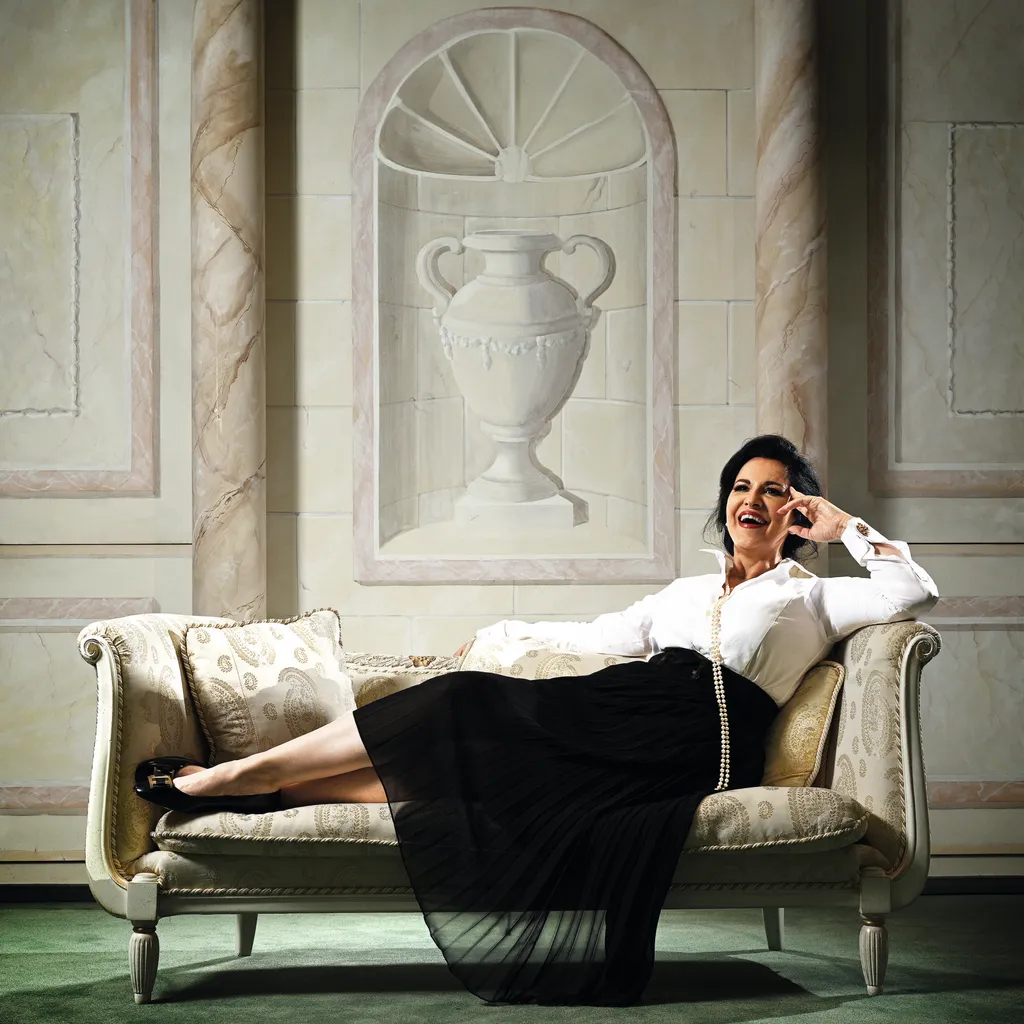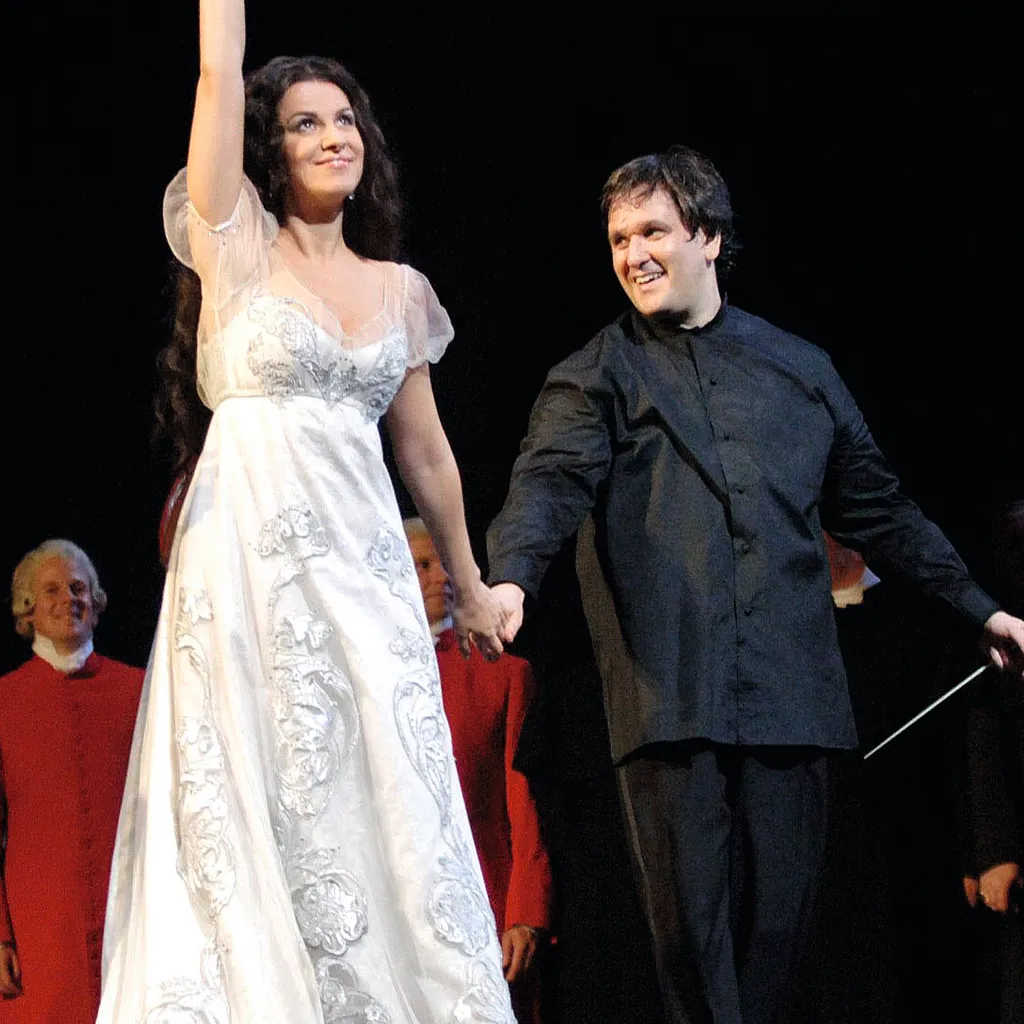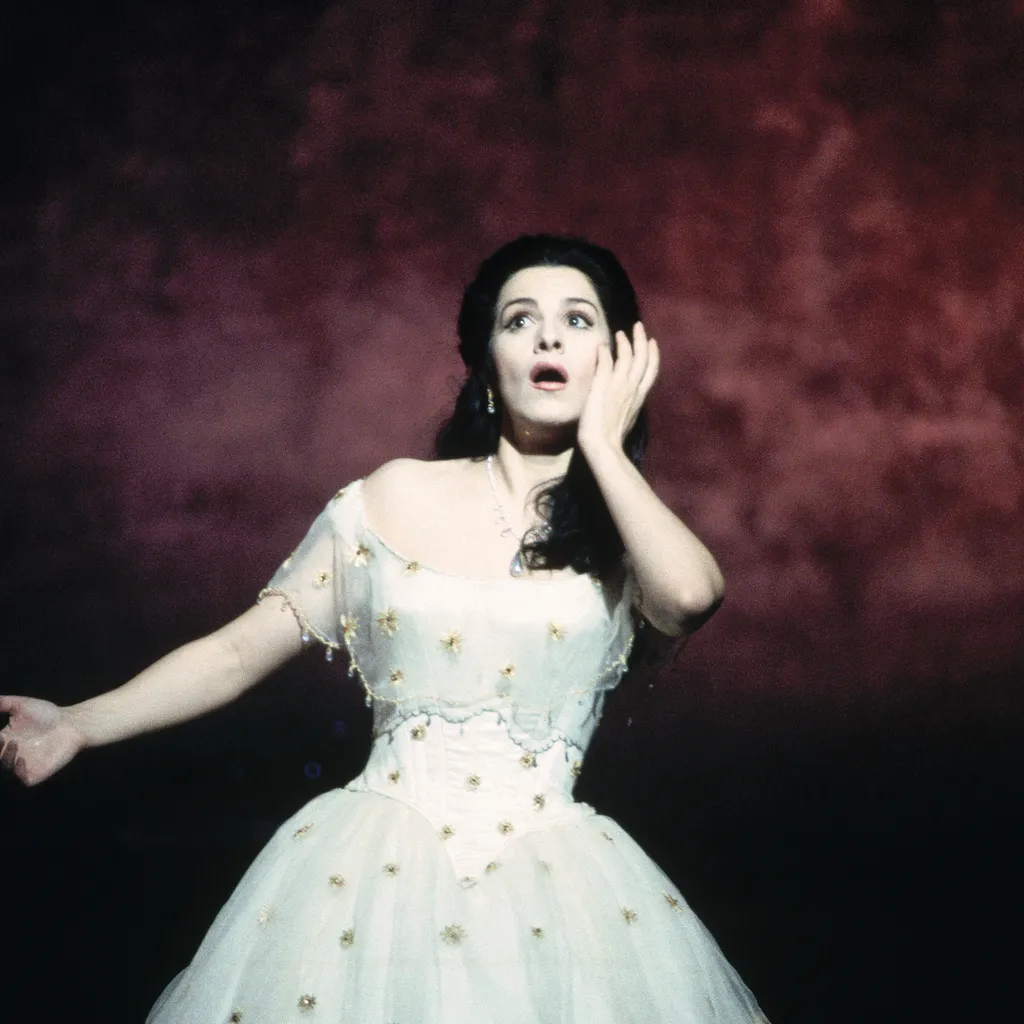‘There’s something cinematic about Puccini. In a song or an aria of perhaps no more than two pages he can write a whole story. He knew how to go to the heart of it.’ Angela Gheorghiu might well be describing herself. On stage she has the presence of a movie star and cuts straight to the emotional chase. Strong men have gone weak at the knees at her Tosca confronting Baron Scarpia and Gheorghiu’s Madame Butterfly must have done wonders for the sale of handkerchiefs.
Why Angela Gheorghiu is returning to Puccini
Now, along with pianist Vincenzo Scalera, she has made a recording (for Signum) of Giacomo Puccini’s songs. ‘I feel I need to sing Puccini. I’ve been recording for 30 years now, so I thought for the centenary of Puccini’s death, and because I recognise that he is really suitable for my voice, I would sing all of his music, including the songs.’
Not all of the extant songs for, as Gheorghiu reminds me, the provenance of some are now challenged by the Puccini Foundation. The singer has selected 17 of them. ‘To tell the truth, I adore everything connected with the number seven! I was born on the seventh,’ says Gheorghiu. ‘Of course, this is a happy coincidence.’
Strong men have gone weak at the knees at her Tosca confronting Baron Scarpia and Gheorghiu’s Butterfly must have done wonders for the sale of handkerchiefs
Puccini wrote songs throughout his composing life, from his student years in Milan in the 1880s to his last days after World War I, when he was acknowledged as the Grand Old Man of Italian Opera. It’s tempting to think of him as embracing a tradition of song writing, which, by the early-19th century, had become the birth-right of every Italian composer. But unlike Rossini, Bellini, Donizetti and later Tosti, Puccini’s songs are not really for the drawing room or salon. He wrote them for himself, for his friends and sometimes as commissions, which is not to say that they are footnotes to the operas. As musicologist Michael Kaye shrewdly observes, ‘His songs reflect the stages of development of his very personal musical language’.
He wrote ‘E l’uccellino’, a beguiling lullaby, for Memmo Lippi, the son of a doctor friend who had died of typhus a few days after his marriage; ‘Avanti, Urania!’ was composed two years earlier in 1896 to celebrate the purchase of Urania, a 179-ton iron screw steamer, by his friend the Marchese Ginori-Lisci, an aristocrat who invited the composer on his estates to indulge his passion for hunting; ‘A te’, a love song, dates back to when Puccini was still a student in his hometown of Lucca. ‘It’s the first song he ever wrote,’ says Gheorghiu. ‘He was very young. What we hear is that Puccini wrote a song when a melody came into his head.’

The challenges of singing Puccini's music
Gheorghiu argues that the songs, which she has been including in her recital programmes for a while now, are not always easy for the singer. There are ‘tough aria-like numbers, including two that would become tenor arias in the operas. It was quite an experience for me to be a tenor and a soprano in a single recording!’
Then there’s the balance between music and words – often by admired poets like Antonio Ghislanzoni, Luigi Illica and Giuseppe Adami, who also turned their hands to libretti. ‘Puccini is always concerned with the words. He had a history of fighting with his librettists to get just what he wanted,’ explains Gheorghiu. ‘He wanted a beautiful relationship between the text and the music. And the accompaniment is very different from Verdi and bel canto, where the piano and the orchestra isn’t that important. [With Puccini] it’s really a duet between me and the piano and very theatrical in the setting of the words. This suits my character!’
And what are the particular challenges for the singer who takes on these songs? ‘The tessitura is sometimes very high; in some of them you need a vocal purity and to be able to sing softly, which fits like a glove for me! In each of the songs you have to find a little drama. And you have to find the right colour for your voice.’
Gheorghiu admits that singing a song like ‘Mentia l’avviso’ (‘It was a false alarm’) ‘is like climbing Everest!’ It’s a recitative and aria, a graduation exercise set by the Milan Conservatoire in June 1883 with a text by Felice Romani, who wrote libretti for Bellini and Donizetti. Here, the captain of an army of Moors sings of the woman he both fears and yet longs to see. And it’s him not her. ‘It’s a tenor aria! Throughout my career when I have studied my roles, I have also studied the arias for the tenors. And I’ve sung all of Puccini’s tenor arias too, like “Nessun dorma”!’ Gheorghiu is laughing now. ‘And “Mentia l’avviso” is a long, long song, like an aria!’
Gheorghiu argues that the songs, which she has been including in her recital programmes for a while now, are not always easy for the singer
Puccini as a borrower of his own music and songs
With characteristic panache, Puccini acknowledged that he was a theatre composer in a letter to a friend: ‘I have never written a lied or a romance. I need the great window of the stage – there I am at ease. When travelling I cannot see a landscape or hear a word without thinking of a possible dramatic situation.’
As you listen to Gheorghiu singing Puccini’s songs, you begin to realise that they too are a window onto the stage. Wasn’t that the tenor aria from the revised second act of La rondine? And surely there’s more than a hint of Tosca’s entry in those particular phrases? As for ‘Mentia l’avviso’, it becomes an aria for Des Grieux in Manon Lescaut. Never a composer to waste a good tune, Puccini frequently borrows from his own songs. When pressed on this he responded with a classic defence: can you steal from yourself? ‘Let us speak the truth. Where is the theft? I robbed myself. Am I then the thief? I would be the victim too.’
So are these songs first thoughts for the operas? Gheorghiu dismisses a suggestion that they constitute a kind of ‘laboratory’ in which Puccini experimented with musical ideas. No, she says, Italian composers always borrowed their own music. Rossini, for example, was a master of such larceny. Ever the practical artist, Gheorghiu says it’s natural: ‘[In the theatre] you are working to order. Like Verdi and the composers before him, [you are] “commanded” by La Scala or other houses to write for them: “On that particular date we need to do that opera.” If you have a deadline you have to work quicker than when you have your own time. And [suppose] you have [a] “library” with ideas and melodies; you look in there.’
Why Angelia Gheorghiu has avoided one particular Puccini heroine
Gheorghiu has sung nearly all of Puccini’s heroines on stage, from Manon to Tosca, and her recording of Madam Butterfly with Jonas Kaufmann was award winning. Yet she has kept her distance from Minnie in La fanciulla del West and Turandot, roles that for half a century now have been reserved for heavy-duty dramatic sopranos.
‘I sang Turandot on one of my recordings – the aria “In questa reggia” and the role of Liù too. But I’ve never sung Turandot on stage because in our time you cannot sing the role with a beautiful voice. Generally, you need a heavy sound for Turandot to be bigger than the chorus, the orchestra and the tenor. It’s like a continuing fight.’
There’s a conspiratorial laugh and Gheorghiu continues, ‘I prefer to sing the notes. Birgit Nilsson sang Wagner and Turandot, but this is an exception. She could do it in her way.’
Angela Gheorghiu's enduring relationship with the Royal Opera
Gheorghiu has always found a home at the Royal Opera in London. Two of its music directors have been her favourite collaborators both on stage and in the recording studio: Georg Solti and Antonio Pappano. ‘When I first started to record Puccini with Tony Pappano, I understood his way of making music,’ she says. ‘He has this knowledge about singers because his father was a singer and before he began to conduct, he was an accompanist. So I could discuss with him how it has to be conducting an orchestra for a voice.’
It was Georg Solti who launched Gheorghiu’s British career with a La traviata that robbed critics and audiences of superlatives. To this day, Gheorghiu clearly remembers the first full orchestral rehearsal in the opera house for her colleague’s unusual approach. ‘Solti did something I had never seen before from such an important conductor,’ she says. ‘He left an assistant in charge in the pit and during the entire rehearsal he was in different places in the opera house right to the highest level to hear how my voice sounded with the orchestra. He made some notes and then he told the orchestra how to play for my voice. It’s not a fight. The conductor needs to understand how to play with his orchestra in partnership with the voices he has in front of him.’

This January Gheorghiu returns to Covent Garden to sing Mimì in Puccini’s La bohème. In 1992, her debut in the role there was a compelling performance – a Mimì who was more than the demure seamstress from the upstairs attic who mislays her key. She knew exactly what she was doing when she was thrown together with the poet Rodolfo after he had blown out the most celebrated candle in opera. With Gheorghiu, this was a knowingly flirtatious Mimì.
Gheorghiu strives to make her characters credible. And being credible means knowing who they are – in the case of Mimì, understanding hunger and ambition. And Gheorghiu knew both when she was growing up. ‘I was at boarding school in Romania [during the communist period]. I was living La Vie Bohème. You have nothing, but you dream that you are the king or queen of the world, that you will become the most wonderful artist. I remember we were eating cabbage with sugar because we had no food. I know that kind of situation.’

Musical melancholy
The final song on Angela Gheorghiu’s new recording is ‘Melanconia’, a recently discovered number that dates back to the early 1880s. ‘The melody is very beautiful but the atmosphere is sad and dark,’ she says. Indeed – Antonio Ghislanzoni’s text is suffused with melancholy:
When I shall be dead,
The swallows will still build
their white nests on my cottage…
And there, between the grasses
and the blackthorn,
Beneath the black cross,
The silence will be eternal, eternal the cold
With two exceptions, death is ever-present in Puccini’s operas. The beautiful do indeed die young. When his own time came, the composer had planned for a mausoleum in his house. As Gheorghiu reminds us, ‘He was always interested in death and that dark part of life. And I had an answer to this when I saw that he had built his tomb within one of his houses.’ Ars longa, vita brevis! Puccini died in his sixties on 29 November 1924, but nearly a century later his heroines are still very much on stage – La bohème and Tosca are two of the five most-performed operas around the globe.
